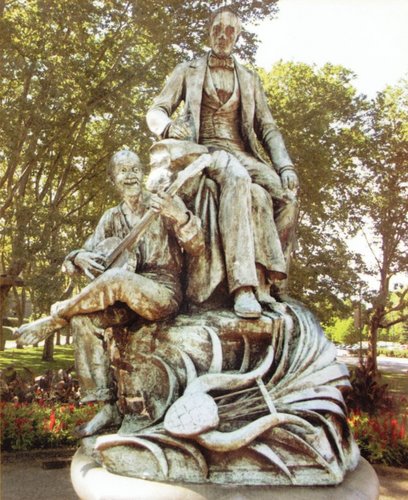July 10 おおカリフォルニア!(17) おおスザンナ! (17) Oh! California Oh! Susanna 5番まである「おおスザンナ」 (1848) [歌・詩]
July 10, 2008 (Thursday)
Library of Congress 所蔵の楽譜をかたっぱしから開けて見ていたら、5番まで歌詞がある「おおスザンナ」があったざんす。
"Music for the Nation: American Sheet Music, ca. 1820-1860 -- For Teachers" 〔Teachers preview page〕
Music for the Nation: American Sheet Music, ca. 1820-1860, provides access to sheet music copyrighted between the years of 1820-1860. Included are popular songs, operatic arias, piano music, sacred and secular vocal music, solo instrumental music, method books and instructional materials, and some music for band and orchestra. Some of the more notable titles include "Susanna" and "Jeannie with the Light Brown Hair".
"Music for the Nation: American Sheet Music, ca. 1820-1860" 〔in American Memory Music Division, Library of Congress〕
Music for the Nation: American Sheet Music, ca. 1820-1860 consists of over 15,000 pieces of sheet music registered for copyright during the years 1820 to 1860. This collection complements an earlier American Memory project, Music for the Nation: American Sheet Music 1870-1885 as well as the Band Music from the Civil War Era and Sheet Music from the Civil War Era. Included are popular songs, operatic arias, piano music, sacred and secular vocal music, solo instrumental music, method books and instructional materials, and some music for band and orchestra. This collection of American and European composers provides an interesting chronicle of the developments in the music publishing business in the nineteenth-century United States. Other notable elements include the burgeoning popularity of the polka, as well as the songs of Stephen Collins Foster (1826-64), who composed such as favorites as "Susanna," "The Old Folks at Home," and "Jeanie With the Light Brown Hair." Songs in this collection also reflect the growing fame of performers such as the singing Hutchinson family and the first American tour (arranged by P. T. Barnum) of soprano Jenny Lind, the "Swedish nightingale." This collection reflects the development of popular song in America.
ここの "Search by Keyword" で "Susanna" で検索をかけると26件でてきます(上の解説中の "Susanna" のリンクだと15件しかでてこないで、そのなかには入っていないのですが・・・・・・なぜ? )。 その24件目――
<http://memory.loc.gov/cgi-bin/query/D?mussm:24:./temp/~ammem_tHP1::>
Susanna don't you cry for me / by William Clifton
CREATED/PUBLISHED
New York: Atwill, 1848
.....................
DIGITAL ID
sm1848 440920 http://hdl.loc.gov/loc.music/sm1848.440920
というのがLibrary of Americaによる記述の一部です。アイテムを開けてみてみると、1枚目の下に手書きで "Deposted in Clerk's Office So. Dist. N.Y. Aug. 28. 1848" とたぶん記載されていて、そのうえの楽譜の下のところに印刷されている文章 "Entered according to Act of Congress, in the year 1848, by Joseph F. Atwill, in the Clerk's office of the District Court, of the Southern District of New York." には月日の記載はないですけど、ふたつは合致しています。そして、この表紙のない譜面の最初にはタイトルが全部大文字で "SUSANNA DONT YOU CRY FOR ME." とあり、その下に "Rewritten & Arranged by William Clifton" と書かれています。
細かいことをいいますと、大文字だとアクセント記号やその他の記号が反映されないということはありえますけど、この楽譜の歌詞の場合、本文でくりかえし "dont" と apostrophe のないかたちをとっていますから、タイトルも "Susanna Dont You Cry for Me" としてよいと思われます。 それから、William Clifton というのは調べてみると先輩作家で、作詞も作曲もする人でした。そして、この曲の場合、はっきりと "Rewritten & Arranged" と書いてありますから、Clifton はもともとのoriginarity を主張してはおらず、フォスターとは書いていないけど誰かの詞を "rewrite" し、誰かの曲を "arrange" した、というのが明確です。そしてこの楽譜は1848年8月に、そういうものとしてcopyright をとっている、これも明らかです。
さて、前年1847年の夏の初演以来New York のChristy 劇団をはじめさまざまなミンストレルショーでとりあげられて演奏され歌われていた「おおスザンナ」に対する先輩作家の詩の方の「アレンジ」は以下のように、Peters 版でいうと1~3番、Holt 版でいうと1~4番のすべてにわたり、さらに3番のスザンナのあとにもう一連夢の続きを入れ、そこにスザンナの話を入れる、というものでした。
SUSANNA DONT YOU CRY FOR ME.
Rewritten & Arranged by William Clifton
1.
I cum from Alabama,
Wid my banjo on my knee,
I’m gwin to Lousiana,
Dat my true lub I may see;
It rain'd all night de day I leff,
De wedder it was dry,
De sun so hot I frose to deff,
Susanna dont you cry.
Oh, Susanna,
Dont you cry for me,
I’m cum from Alabama,
Wid my banjo on my knee.
2.
I jump aboard de telegraff,
And steam'd it down de riber,
De lectric fluid den multiplied,
And drown tre tousen nigger;
De bulljine burst, de horse run off,
Dis nigger almost die,
I shut my eyes to hole my breff,
Susanna dont you cry. Oh, Susanna &c.
3.
I had a dream de udder day,
When ebry ting was still,
I dreampt I se'd Susanna,
A rolling down de hill;
De buckweat cake was in her mouff,
De lasses in her eye,
Says I, watt makes de tears run so,
Susanna dont you cry. Oh, Susanna &c.
4.
She said, she had been trableing,
Wid de rail road in her hand,
Den de baggage car flew off de track,
And threw her in de sand;
To stop de steam drom choakin her,
She fill her mouff and eye,
I den awoke, and said to her,
Susanna dont you cry. Oh, Susanna &c.
5.
I soon will be in New Orleans,
And den I’ll look all round,
And should I find Susanna,
I'll fall upon de ground;
But if I do not find her,
Dis darky sure will die,
And when I’m dead and buried,
Susanna dont you cry. Oh, Susanna &c.
4番だけ訳してみます。
4.
あいつが言うには、あたしゃ鉄道片手に
ずっと旅してきたという。
そしたら貨物車両が線路をとびだして
あいつは砂の上に投げ出された。
蒸気で息がつまらないように
あいつは口と目をふさいだと。
そこでおいら目が覚め、言ったね。
スザンナ、泣くんじゃない。
おお、スザンナ、おいらのために泣くんじゃない。
おいらアラバマからバンジョー抱いて
やってきたぞ。
trableing=traveling choaking=choking mouff=mouth
うーん。間接話法ですね。
すぐにわかるように、これは2番の、語り手が旅してきた様子と対応した詩になっています(2行目と4行目の終わりが韻を踏むのは他でも同じで、ちゃんとこの4番も踏んでます)。で、そこのところでCliftonという人の原詩(詞)の読みが前提になっているわけで、興味深いわけです。
元の歌詞の3番はある静かな夜に語り手が夢でスザンナを見る。スザンナは口にケーキを、目には涙をためて、山だか丘だかを駆けおりてくるわけですが、エマソンみたいな人はフォスターの故郷の風景にダブらせるのでしょう。だがClifton は、挿入した4番の詞で、スザンナの方も旅してきたという設定をこしらえます(もちろんあくまで語り手の夢の中での話ですが)。語り手が汽船で水路を旅してきた(というのがモーリちゃんの父の読みなのですが)のに対して、スザンナは汽車でやってきます(「バンジョー膝に」に対する「鉄道片手に」"rail road in her hand"はナンセンスですけど・・・・・・こういうのをみるとtelegraph に乗るって電信に乗るというナンセンスだと表層の意味ではとらえられていたのですかね、やっぱり、と思わされます)。
そして2番と同様に乗り物の事故が起こる(モーリちゃんの父は暫定訳では出航時の騒ぎみたいにとろうとしたのですが・・・訂正しちゃおっかなー笑)。
そして2番と同様に目と口をふさぐ。
はんぶんまじめに、いや、はんぶん冗談に書くと、この新たな4番の詞が指し示す読みの可能性というのは、最初からナンセンスなもの――昼と夜、暖と寒、乾と湿、地と水、の混乱・混淆――をはらんでいた「おおスザンナ」の世界は、実は全体が夢であった、ということかもしれません。電気と蒸気の混乱ということも生をおびやかす文明の象徴としてある。のならば、語り手とスザンナのふたりが生気のみなもととしての息 (breath = spirit) を守る身振りは、夢の中での文化的抵抗である。あとtravel = trouble みたいな遊び。それらはいずれもポーの「息の喪失」ともつながる。・・・・・・(つながらないっちゅうの)
冗談はさておき、Cliftonの4番の追加以外の書き換えは、だいたいは(1,3,5番はJames Taylor 〔前の記事〕や、あるいは訳詞のレベルで久保田麻琴や斎藤哲夫が行なったのと同じような細部だと思うのですが、例外的に2番は違いますねえ。
June 25 Oh! Susanna 2番の歌詞の解釈(暫定版)
11 I jumped aboard de telegraph,12 And trabbelled down de riber,13 De Lectric fluid magnified,14 And killed five hundred Nigger15 De bullgine bust, de horse run off,16 I realy thought I'd die;17 I shut my eyes to hold my breath,18 Susanna, dont you cry.
見やすいようにClifton 版―
I jump aboard de telegraff,
And steam'd it down de riber,
De lectric fluid den multiplied,
And drown tre tousen nigger;
De bulljine burst, de horse run off,
Dis nigger almost die,
I shut my eyes to hole my breff,
Susanna dont you cry. Oh, Susanna &c.
4番のスザンナの trableing をいかすために steam'd に動詞が変えられるのはわかる。steam'd it として "it" は "de telegraph" だから、関係がよりわかるようになった(そうか?)。"magnified" を "multiplied" に、"five hudred Nigger" を "tre tousen nigger" (tre=three; tousen=thousand) へ変えたのはよくわかりません。"killed" を "drowned" に変えたのは意味の明確化というよりは婉曲化なのだろうか。主語を何に想定しているかは不明。6行目の "I really thought I'd die" を "Dis nigger almost die" に変えるのは、原詩(詞)ではテキスト上は4番(Cliftonだと5番)で "this darky" と出てきて、語り手が黒人であることがわかるのを、早い段階で明かす効果はある(前にも書いたようにミンストレル・ショーの舞台では話は別です。テキスト外で、話者が「見え」ますから)。その効果はやはり2番のviolence を婉曲化するのが主眼だったのでしょうか。
いろいろ考えさせられますが、 まあ、4番を加えたんで2番も直したというのが基本だとは思います。
さて、モーリちゃんの父は、もちろんこれをフォスターの幻の「おおスザンナ」という気は毛頭ありません。ただ、歌が勝手に歌詞をつけくわえられたり、替え歌ができたり、というのはその歌の力の証しかもしれなくて、そういう意味で、「おおスザンナ」が早い段階で(不幸な歌詞のバラつきや印刷ミスや勝手な改変はさておき)「応答」されたことを面白く思ったのでした。
Pittsburgh 市Schenley Park 内のFosterとスザンナの彼氏のツーショット像 (ちょっとおふたりとも顔が怖いんですけど)
〔Susan Zannos, The Life and Times of Stephen Foster (Hockessin: Mitchell Lane [Masters of Music Series], 2004)〕






コメント 0